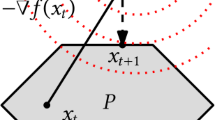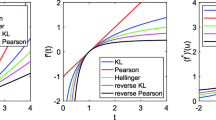Abstract
In this paper we consider covariance structural models with which we associate semidefinite programming problems. We discuss statistical properties of estimates of the respective optimal value and optimal solutions when the ‘true’ covariance matrix is estimated by its sample counterpart. The analysis is based on perturbation theory of semidefinite programming. As an example we consider asymptotics of the so-called minimum trace factor analysis. We also discuss the minimum rank matrix completion problem and its SDP counterparts.
Similar content being viewed by others
Notes
As it was pointed before, the constraints in (2.20) are invariant with respect to replacing matrix E by matrix ET for an arbitrary nonsingular \((p-r)\times (p-r)\) matrix T. Therefore, unless stated otherwise, for the sake of computational convenience we assume that matrix E has orthonormal columns.
The index set \(\tau \subset \{1,\ldots ,p\}\times \{1,\ldots ,p\}\) is symmetric in the sense that if \((i,j)\in \tau \), then \((j,i)\in \tau \), and is formed by such (i, j) that \((i,j-n_1)\in \iota \) for \(1\le i\le n_1\) and \(n_1+1\le j\le n_1+n_2\), and the respective (j, i) otherwise.
In case of normally distributed population the covariance matrix \(\varGamma \) is completely defined by the respective matrix \(\varSigma _0\) (see (3.1)). In general, components of \(\varGamma \) can be estimated by the respective estimates of fourth order moments.
References
Alizadeh, F., Haeberly, J., Overton, M.: Complementarity and nondegeneracy in semidefinite programming. Math. Program. 77, 129–162 (1997)
Arnold, V., Gusein-Zade, S., Varchenko, A.: Singularities of Differentiable Maps, vol. 1. Birkhäuser, Boston (1985)
Bentler, P.: Lower-bound method for the dimension-free measurement of internal consistency. Soc. Sci. Res. 1, 343–357 (1972)
Bonnans, J., Shapiro, A.: Perturbation Analysis of Optimization Problems. Springer Series in Operations Research. Springer, New York (2000)
Browne, M.: Generalized least squares estimators in the analysis of covariance structures. S. Afr. Stat. J. 8, 1–24 (1974)
Candés, E., Recht, B.: Exact matrix completion via convex optimization. Found. Comput. Math. 9, 717–772 (2009)
Chandrasekaran, V., Sanghavi, S., Parilo, P., Willsky, A.: Rank-sparsity incoherence for matrix decomposition. SIAM J. Optim. 21, 572–596 (2011)
Dür, M., Jargalsaikhan, B., Still, G.: Genericity results in linear conic programming—a tour d’horizon. Math. Oper. Res. 42, 77–94 (2017)
Fazel, M.: Matrix rank minimization with applications. Ph.D. thesis, Stanford University (2002)
Golubitsky, M., Guillemin, V.: Stable Mappings and Their Singularities. Springer, New York (1973)
Helmke, U., Moore, J.: Optimization and Dynamical Systems, 2nd edn. Springer, London (1996)
Robinson, S.: Local structure of feasible sets in nonlinear programming II: mondegeneracy. Math. Program. Study 22, 217–230 (1984)
Scheinberg, K.: Handbook of semidefinite programming. In: Wolkowicz, H., Saigal, R., Vandenberghe, L. (eds.) Parametric Linear Semidefinite Programming, Chap. 4, pp. 93–110. Kluwer Academic Publishers, Boston (2000)
Shapiro, A.: Rank reducibility of a symmetric matrix and sampling theory of minimum trace factor analysis. Psychometrika 47, 187–199 (1982)
Shapiro, A.: Weighted minimum trace factor analysis. Psychometrika 47, 243–264 (1982)
Shapiro, A.: Extremal problems on the set of nonnegative definite matrices. Linear Algebra Appl. 67, 7–18 (1985)
Shapiro, A.: First and second order analysis of nonlinear semidefinite programs. Math. Program. 77, 301–320 (1997)
Shapiro, A.: Duality, optimality conditions, and perturbation analysis. In: Wolkowicz, H., Saigal, R., Vandenberghe, L. (eds.) Handbook of Semidefinite Programming, Chap. 4, pp. 67–92. Kluwer Academic Publishers, Boston (2000)
Shapiro, A., Dentcheva, D., Ruszczyński, A.: Lectures on Stochastic Programming: Modeling and Theory, 2nd edn. SIAM, Philadelphia (2014)
Shapiro, A., Fan, M.: On eigenvalue optimization. SIAM J. Optim. 5, 552–569 (1995)
Shapiro, A., Ten Berge, J.: Statistical inference of minimum rank factor analysis. Psychometrika 67, 79–94 (2002)
Ten Berge, J., Snijders, T., Zegers, F.: Computational aspects of the greatest lower bound to the reliability and constrained minimum trace factor analysis. Psychometrika 46, 201–213 (1981)
Acknowledgements
The author is indebted to anonymous referees for constructive comments which helped to improve the manuscript.
Author information
Authors and Affiliations
Corresponding author
Additional information
This research was partly supported by NSF grant 1633196 and DARPA EQUiPS program grant SNL 014150709.
Rights and permissions
About this article
Cite this article
Shapiro, A. Statistical inference of semidefinite programming. Math. Program. 174, 77–97 (2019). https://doi.org/10.1007/s10107-018-1250-z
Received:
Accepted:
Published:
Issue Date:
DOI: https://doi.org/10.1007/s10107-018-1250-z
Keywords
- Semidefinite programming
- Minimum trace factor analysis
- Matrix completion problem
- Minimum rank
- Nondegeneracy
- Statistical inference
- Asymptotics




